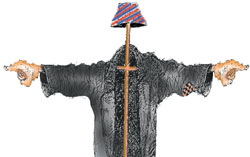 Nepal has a new conflict and the 'internationals' can\'t wait to get involved. With no humility about their dismal failure in past conflict resolution efforts, and blinded by their distaste for Nepali political players, many donors are angling for a greater political role in the tarai. But Kathmandu's diplomatic corps, including UNMIN, would best keep their hands off the madhesi cauldron as their increased role could well be counter-productive.
Nepal has a new conflict and the 'internationals' can\'t wait to get involved. With no humility about their dismal failure in past conflict resolution efforts, and blinded by their distaste for Nepali political players, many donors are angling for a greater political role in the tarai. But Kathmandu's diplomatic corps, including UNMIN, would best keep their hands off the madhesi cauldron as their increased role could well be counter-productive.
Some well-intentioned diplomats, worried about the turbulence in the tarai, are keen to help. Others, especially within the UN, see an opportunity to step in as facilitators, a role they are used to and missing here. Madhesi groups egg them on, believing this will internationalise the issue and give them equal standing with the state.
They don't realise an outside role would be neutral and may even go against their interests-look at the Maoist-UNMIN tussle on verification. And anyway this is not the view of most madhesis, who may be pleased with the attention but know they have to live and deal with Kathmandu politicians, not diplomats, UN peacemakers, or conflict advisors.
The problems in the tarai can still be resolved within the framework of the national polity by local actors. Only when the present establishment sits of its own accord with the protesting groups, reconciles interests, and implements promises can Nepal develop a stable political structure. The country is going through a necessary, albeit painful, phase of inclusive nation-building as a result of the opening up of democratic space. There are no neat solutions, and what will emerge is some form of compromise.
An interventionist international role could distort this fragile process by snatching political decision-making away from the ground, thus weakening local political institutions that need to be reformed and strengthened. In the case of UNMIN, closer engagement with the madhesi groups could further upset its relations with the Maoists and take focus away from its core mandate.
Many experts come to Nepal from the Balkans or Sri Lanka and view the madhesi issue solely through an ethnic prism. Their limited understanding stems from various factors: there is little literature (in English) to explain the tarai; most diplomats and donors have never interacted with madhesi political and civil society figures, who are comfortable in Maithili or Nepali; their sources are first-hand reports of violence and select interlocutors who represent only one view and have their own interests; and finally, they do not know the caste structure and district-level political dynamics. Until six months ago, most internationals had no clue about madhesis. A multimillion rupee World Bank project on inclusion barely mentioned the madhesi sense of exclusion, and a hasty postscript is now being funded and prepared.
The context is different but it is instructive to look to 1950s Nehruvian India. A democratic framework was being built in a diverse country; contentious issues were the shape of federal structure and linguistic policy. The Delhi elite faced protests ranging from street agitation in the south and west to armed struggle in the northeast. While problems remain, one of the reasons Indian democracy survives is because it was adapted to local conditions by local actors without outside mediation or solutions.
Internationals believe only they can effectively mediate in the tarai because there is a trust deficit. But the trust issue is not irresolvable. After all, the Nepali Congress and the Maoists, who have a history of acrimony, together carved out the 12-point agreement. Such dialogue on madhesi concerns will happen with initiative and pressure from the ground on leaders to talk, not with more activity, staff, or report-writing at UNMIN.
Like it or not, India is a critical player in the peace process and its distaste for international involvement in Nepal has to be considered. New Delhi grudgingly agreed to UNMIN. But the tarai is much closer to the Indian heartland across the open border. The internationals must out of pragmatism give up hopes of a greater role.
But India\'s displeasure is a sideshow. For a sustainable solution, this problem must be resolved by the Nepali political class. The cocktail circuit is abuzz with ideas-some donor officials recently suggested the EU offer its good offices on the tarai issue. One wonders whether they realise the absurdity of the idea of their sipping tea with madhesi leaders in Patna and Darbhanga hotels.
Let Nepali players-politicians and agitators-do their job, make mistakes, and carve out an accommodation. A Birganj-based analyst sounds a cautionary note: the more blue plate cars in the tarai, the longer this conflict stretches. Give Nepal, including the tarai, some respect.
Related Articles
. Meet the press
. United they stand



